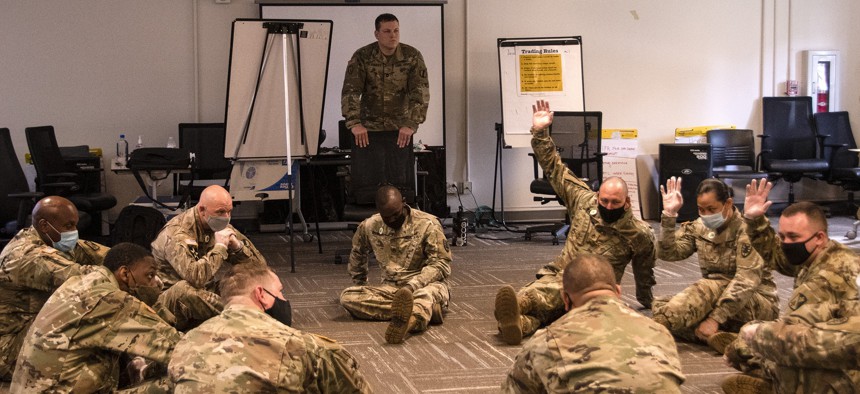
Soldiers participate in equal opportunity training at Fort Eustis, Virginia, June 23, 2020. Army / David Overson
Hundreds of Troops Complain About ‘Woke’ Racism, Extremism Training, Cotton Claims
Senator confronts Austin, releases list of purported examples of Black Lives Matter advocacy, anti-white male bias, and diversity efforts.
During a drill weekend, unit leaders held a stand down on race—a pause in their usual training—where they taught troops about white supremacy and the importance of staying apolitical on social media. But one service member balked at the training’s focus on far-right extremist groups, not other organizations like Black Lives Matter or Antifa.
“Anyone who has been face to face with them during the riots will tell you they are in fact well organized militant hate groups,” the service member wrote. “However, we are encouraged to stand with them, but not groups that stand for the Constitution.”
Sen. Tom Cotton, R-Ark., says this is one of more than two dozen stories that show the military has gone too far with what another service member called “fake wokeness.” In a memo from Cotton to the Senate Armed Services Committee obtained by Defense One, the senator includes 28 written complaints from troops, which could not be independently verified, about training sessions and regulations that service members argue paint the military as fundamentally racist and support left-leaning groups while labeling conservative movements as extremist. Cotton and Rep. Dan Crenshaw, R-Texas, two weeks ago set up a public whistleblower site inviting service members to complain about “woke ideology” in the military.
“Many struggle to connect on why we heavily condemned Jan 6 but refused to talk about the violent riots during the summer of 2020. Many had questions about groups like Antifa not being discussed during out [sic] extremism presentation,” another service member wrote.
One member of the military wrote that a Black Lives Matter flag hung on a naval installation in Africa “was offensive and distracting to me, especially in a combat zone.” When he asked about it, a commander told him the movement was “not political and non-partisan.” But the same service member said he was told he could not hang a “Make America Great Again” flag supporting President Donald Trump’s 2020 election campaign because it would be “a very political statement and cause a lot of offense.”
Another allegedly wrote the senator to complain that a “forced” discussion session on racism occured only after “the baseline assumption that systemic racism is real and an existing problem we have to face was locked in as fact.”
Another complained, “The training was about extremists. The only example of extremist groups that was given was white Supremist [sic] groups.” Yet another complained after hearing an senior leader advocate for Black Lives Matter, saying she “told us that we all need to support this cause because it is morally right.” But, the service member complained, “This group is particularly hostile, and doesn’t align with my morals in any fashion. When Senior Non-Commissioned Officers inject their politics into the workplace, we lose our apolitical nature and ability to complete tasks with everyone around in a more effective nature.”
Cotton confronted Defense Secretary Lloyd Austin at a Senate Armed Services Committee hearing on Thursday, saying that he’s received “several hundred” whistleblower complaints since President Joe Biden took office, and claimed that people are leaving the military because of training based on critical race theory.
“We’re hearing reports of plummeting morale, growing mistrust between the races and sexes where none existed just six months ago, and unexpected retirements and separations based on these trainings alone. These are not my words, they’re the words of your own troops,” Cotton said, calling the trainings “anti-American indoctrination.”
It is not clear why Cotton believes this distrust is new. Nearly one-third of Black troops and one-quarter of Asian service members said they had experienced racial discrimination or harassment during the previous 12 months, according to a 2017 survey that was withheld by the Trump administration until January that shows racism in the ranks predated the Biden administration. When survey respondents were asked to consider the one situation over the past year that had the greatest impact on them, 93 percent said it occurred on a military installation and 84 percent said the alleged offender was a member of the Defense Department’s workforce.
One-third of respondents said they thought about leaving the service over the incident they experienced, the survey said.
Cotton asked Austin whether he believes the military is fundamentally racist, and whether troops should be treated differently based on their gender or skin color, but repeatedly cut off the Pentagon’s first Black defense secretary when he tried to answer beyond a “yes or no.”
“Diversity, equity, and inclusion is important to this military now and it will be important in the future,” Austin said. “We’re going to make sure our military looks like America and our leadership looks like what’s in the ranks of the military.”
Cotton aimed all of his questions and charges at Austin, who was appointed by Biden, but did not engage Chairman of the Joint Chiefs Gen. Mark Milley, who sat next to the secretary at the witness table. Milley and all of the Joint Chiefs have supported new Defense Department studies and initiatives to root out racism, white supremacy and extremism, including with strong public statements of support during last year’s Black Lives Matter protests. Last month, Milley remarked on the lack of progress to boost racial diversity in the ranks, pointing out that when now-Air Force Chief Gen. C.Q. Brown, who is Black, joined the military in 1984, just 2 percent of Air Force pilots were Black, a number that remains the same today.
“Opportunity in our military must be reflective of the diverse talent in order for us to remain strong,” Milley said at an ROTC commissioning ceremony at Howard University, one of America’s foremost historically Black colleges and universities, in Washington, D.C. “Our nation is ready to fulfill the promise of our Constitution to build a more perfect union and to ensure equal justice for all people, and it is your generation that can and will bring the joint force to be truly inclusive of all people.”
Cotton isn’t the first Republican to target these types of diversity training. Last September, then-President Donald Trump ordered the federal government to cancel training on critical race theory because it relies on, he claimed, “divisive propaganda to undermine the principle of fair and equal treatment for all.” Biden undid that order on his first day in office, and the military restarted its diversity training programs.
The idea of the military being used as a social experiment has long been a common talking point for social conservatives. But, from the first racially integrated units to women joining the military and eventually fighting in combat to gay, lesbian, and transgender troops being able to serve openly, the Defense Department historically has adapted to social change ahead of the private sector and general public.
The military’s toughness—or its perceived manliness—has been a target of late, particularly from right-wing pundits and policymakers who oppose policies opening up military and combat services to all qualified Americans. Pentagon officials gave a rare public rebuke to a talk show host when Fox News’ Tucker Carlson complained about the introduction of a new flight-suit for women in the military. Carlson’s rant, one of several aimed at the military in recent months, drew widespread criticism from the military and veteran community. U.S. Army Training Command’s Gen. Paul Funk said, “Thousands of women serve honorably every day around the globe. They are beacons of freedom and they prove Carlson wrong through determination and dedication. We are fortunate they serve with us.”
Cotton’s line of questioning directly echoed Carlson’s own challenges to Austin and the military's anti-racism and anti-extremism training. In March, Carlson said, “The key question is, how does Lloyd Austin define a racist or extremist? The definition matters...what you’re seeing is not an attempt to make the military better. What you’re seeing is a political purge of the military.”
Sen. Ted Cruz, R-Texas, has been another top voice speaking out against social change in the ranks. In 2016, Cruz called the idea of women in combat “nuts.” Just last month, he retweeted a video of a Russian recruiting ad, showing men doing pushups and getting their head shaved, alongside an American recruitment commercial of a cartoon girl with two mothers who fought for LGBT rights before joining the military. Cruz came under fire from troops for saying the “woke, emasculated” U.S. military “is not the best idea.”
Cruz responded to the criticism by saying that he was not attacking the military. “We have the greatest military on earth, but Dem politicians & woke media are trying to turn them into pansies,” he tweeted, using an anti-gay slur.







